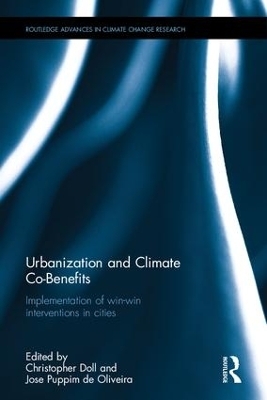
Urbanization and Climate Co-Benefits
Routledge (Verlag)
978-1-138-95344-4 (ISBN)
Urbanization and Climate Co-Benefits examines the main opportunities and challenges to the implementation of a co-benefits approach in urban areas. Drawing on the results of empirical research carried out in Brazil, China, Indonesia, South Africa, India and Japan, the book is divided into two parts. The first part uses a common framework to analyse co-benefits across the urban sectors. The second part examines the tools and legal and governance perspectives at the local and international level that can help in planning for co-benefits.
This book will be of great interest to students, practitioners and scholars of urban studies, climate/development policy and environmental studies.
Christopher N.H. Doll is a research fellow at the United Nations University Institute for the Advanced Study of Sustainability in Tokyo, Japan. He is active across many areas of sustainability research including urban development, biodiversity governance and the diffusion of low carbon technologies. He holds a Masters and PhD in remote sensing from the University of London. Jose A. Puppim de Oliveira is a faculty member at the Getulio Vargas Foundation (FGV/EAESP and FGV/EBAPE), Federal University of Rio de Janeiro (COPPEAD-UFRJ) and Fudan University (Shanghai). He is also a researcher affiliated to the United Nations University (UNU-IIGH) in Kuala Lumpur and MIT Joint Program on Science and Policy of Global Change, Cambridge (USA).
1. Introduction
2. Transport
a. Delhi, India: Governance-Related Opportunities and Barriers towards Effectiveness of Co-Benefits Policies: The Case of Delhi Metro Project
b. Curitiba: The intended/unintended co-benefits of investing in public transport c. Yogyakarta, Indonesia: Technological change and market reform for sustainable urban transport d. Rio de Janeiro, Brazil: The Bus Rapid System
3. Land-use
a. eThekwini Municipality (Durban), South Africa: Greenspace Planning for Climate Co-benefits
b. Yogyakarta, Indonesia: Inter-governmental Cooperation and Land Use Coordination by Joint-Secretariat 4. Buildings a. Shanghai, China & Yokohama, Japan: Energy Efficiency at the Building and District Scale
b. Tokyo, Japan: Low-carbon policy for buildings
5. Energy
a. Kawasaki, Japan: - Revealing co-benefits of energy from environmental policies
b. Megaurban China: Air pollution co-benefits of carbon mitigation in four Chinese cities c. Baoshan District (Shanghai), China: Co-benefits in the industry sector
d. Teixi District (Shenyang), China
6. Waste
a. Yogyakarta, Indonesia: Potential Co-benefits of Community Based Solid Waste Management b. Suzhou, China: Generation and Distribution of Waste Management Co-benefits c. Surat, India: Urban Innovation and Climate Co-benefits in Municipal Sewage Management
7. Recognizing and Rewarding Urban Co-benefits: A Survey of International Climate Mechanisms and Informal Networks
8. Law for Climate Co-benefits
9. Quantitative Tools for assessing co-benefits
10. Decision-support Tools for Climate Co-benefits Governance
11. A systems approach for health/environment/climate co-benefits in cities
| Reihe/Serie | Routledge Advances in Climate Change Research |
|---|---|
| Zusatzinfo | 33 Tables, black and white; 61 Line drawings, black and white; 7 Halftones, black and white; 101 Illustrations, black and white |
| Verlagsort | London |
| Sprache | englisch |
| Maße | 156 x 234 mm |
| Gewicht | 589 g |
| Themenwelt | Naturwissenschaften ► Biologie ► Ökologie / Naturschutz |
| Naturwissenschaften ► Geowissenschaften ► Geografie / Kartografie | |
| Sozialwissenschaften ► Soziologie ► Spezielle Soziologien | |
| Technik ► Umwelttechnik / Biotechnologie | |
| ISBN-10 | 1-138-95344-X / 113895344X |
| ISBN-13 | 978-1-138-95344-4 / 9781138953444 |
| Zustand | Neuware |
| Haben Sie eine Frage zum Produkt? |
aus dem Bereich


